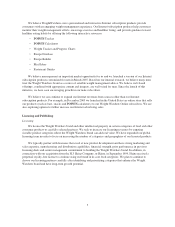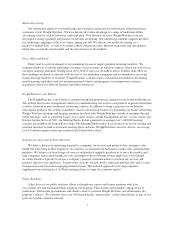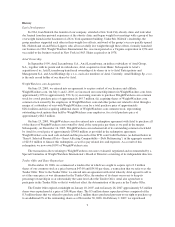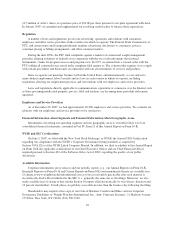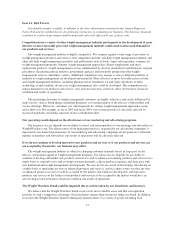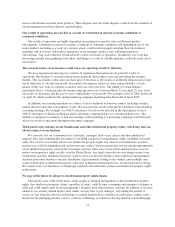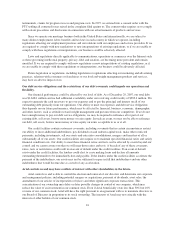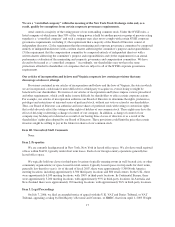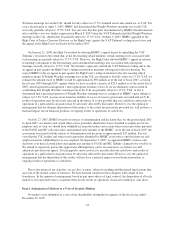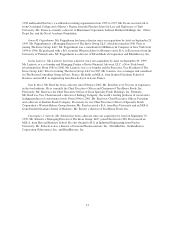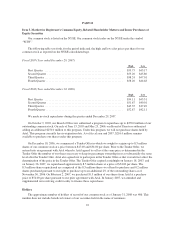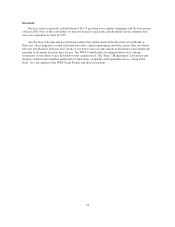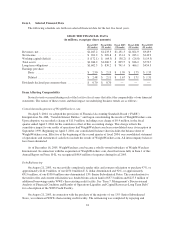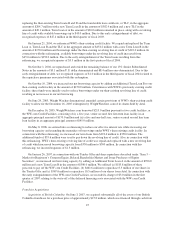WeightWatchers 2007 Annual Report Download - page 28
Download and view the complete annual report
Please find page 28 of the 2007 WeightWatchers annual report below. You can navigate through the pages in the report by either clicking on the pages listed below, or by using the keyword search tool below to find specific information within the annual report.products, services, software, technology or content. If we cannot license, develop alternatives or stop using the
product, service, software, technology or content for any infringing aspects of our business, we may be forced to
limit our product and service offerings. Any of these results could reduce our revenues and our ability to compete
effectively, increase our costs and harm our business.
Any failure of our technology or systems to perform satisfactorily could result in expenditure of significant
resources, impair our operations or damage our reputation.
We rely on software, hardware, network systems and similar technology that is either developed by us or
licensed from third parties to operate our websites and subscription offerings and to maintain the recurring billing
system associated with certain of our commitment plans, such as Monthly Pass. As much of this technology is
relatively new and complex, there may be future errors, defects or performance problems, including when we
update our technology to expand and enhance our capabilities. Our technology may malfunction or suffer from
defects that become apparent only after extended use. In addition, our operations depend on our ability to protect
our information technology systems against damage from fire, power loss, water, earthquakes,
telecommunications failures, vandalism and other malicious acts and similar unexpected adverse events.
Interruptions in our offerings or websites could result from unknown hardware defects, insufficient capacity or
the failure of our website hosting and telecommunications providers to provide continuous and uninterrupted
service. We do not have a fully redundant system that includes an instant back-up hosting facility. As a result of
these possible defects or problems, our websites, our subscription products or certain of our commitment plans
could be rendered unreliable or be perceived as unreliable by customers. Any failure of our technology or
systems could result in the expenditure of significant resources, impair our operations or damage our reputation.
Our reputation and the appeal of our products and services offerings may be harmed by security breaches.
Unauthorized users who penetrate our information security could misappropriate proprietary information or
cause interruptions to the subscription offerings on our websites. As a result, it may become necessary to expend
significant additional amounts of capital and resources to protect against, or to alleviate, problems caused by
unauthorized users. These expenditures, however, may not prove to be a timely remedy against unauthorized
users who are able to penetrate our information security. In addition to purposeful security breaches, the
inadvertent transmission of computer viruses could adversely affect our computer systems and, in turn, harm our
business.
An increasing number of states require that customers be notified if a security breach results in the
disclosure of their personal financial account or other information. Other states and governmental entities are
considering such “notice” laws. In addition, other public disclosure laws may require that material security
breaches be reported. If we experience a security breach and such notice or public disclosure is required in the
future, our reputation and our business may be harmed. Privacy concerns among prospective and existing
customers regarding our use of personal information collected on our websites or through our products and
services, such as weight management information, financial data, email addresses and home addresses, could
keep them from using our websites or purchasing our products or services. Industry-wide events or events with
respect to our websites, including misappropriation of third-party information, security breaches or changes in
industry standards, regulations or laws could deter people from using our websites or purchasing our offerings,
which could harm our business.
Our businesses are subject to legislative and regulatory restrictions.
A number of laws and regulations govern our advertising, operations and relations with consumers,
employees and other service providers in the countries in which we operate. The FTC and certain states and
foreign jurisdictions regulate advertising, disclosures to consumers, privacy, consumer pricing or billing
arrangements, and other consumer matters.
During the mid-1990s, the FTC filed complaints against a number of commercial weight management
providers alleging violations of federal law in connection with the use of advertisements that featured
15


